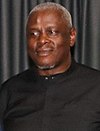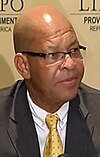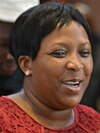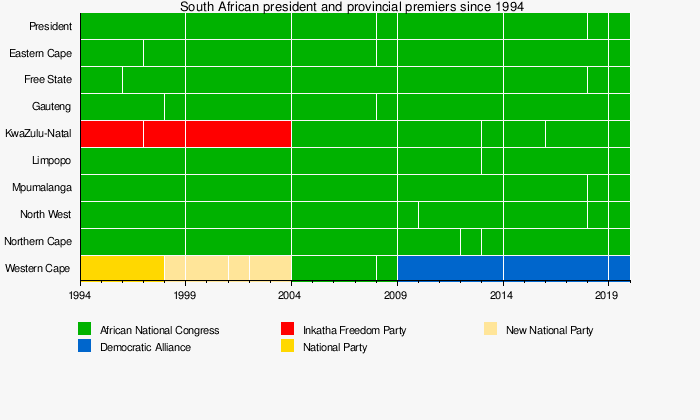The Republic of South Africa is a unitary parliamentary democratic republic. The President of South Africa serves both as head of state and as head of government. The President is elected by the National Assembly and must retain the confidence of the Assembly in order to remain in office. South Africans also elect provincial legislatures which govern each of the country's nine provinces.

South Africa is divided into nine provinces. On the eve of the 1994 general election, South Africa's former homelands, known as Bantustans, were reintegrated into the country, and the four provinces were increased to nine by dividing Cape Province and the Transvaal into three and four, respectively. The twelfth, thirteenth and sixteenth amendments to the Constitution of South Africa changed the borders of seven of the provinces.

The Constitution of South Africa is the supreme law of the Republic of South Africa. It provides the legal foundation for the existence of the republic, it sets out the rights and duties of its citizens, and defines the structure of the Government. The current constitution, the country's fifth, was drawn up by the Parliament elected in 1994 in the South African general election, 1994. It was promulgated by President Nelson Mandela on 18 December 1996 and came into effect on 4 February 1997, replacing the Interim Constitution of 1993. The first constitution was enacted by the South Africa Act 1909, the longest-lasting to date. Since 1961, the constitutions have promulgated a republican form of government.
The Premier of North West is the head of government of the North West province of South Africa. The current Premier of the North West is Bushy Maape, a member of the African National Congress, who was elected premier in September 2021 after the resignation of Job Mokgoro.

The Premier of the Northern Cape is the head of government of the Northern Cape province of South Africa. The current Premier of the Northern Cape is Zamani Saul, a member of the African National Congress, who was elected in the 2019 election. He took office on 22 May 2019.
The Premier of the Eastern Cape is the head of government of the Eastern Cape province of South Africa. The current Premier of the Eastern Cape is Oscar Mabuyane, a member of the African National Congress, who was elected in the 2019 election. He took office on 22 May 2019.

The Premier of Mpumalanga is the head of government of Mpumalanga province in South Africa. The current Premier of Mpumalanga is Refilwe Mtsweni-Tsipane, a member of the African National Congress, who was appointed in March 2018. She took office on 20 March 2018.
In South Africa, a provincial legislature is the legislative branch of the government of a province. The provincial legislatures are unicameral and vary in size from 30 to 80 members, depending on the population of the province. Each legislature is chaired by a Speaker and a Deputy Speaker.

The Premier of the Free State is the head of government of the Free State province of South Africa. The current premier of the Free State is Mxolisi Dukwana, who was elected on 24 February 2023. He is a member of the African National Congress.

The Premier of Gauteng is the head of government of the Gauteng province of South Africa. The current Premier of Gauteng is Panyaza Lesufi, a member of the African National Congress, who was elected on 6 October 2022, following the resignation of David Makhura.
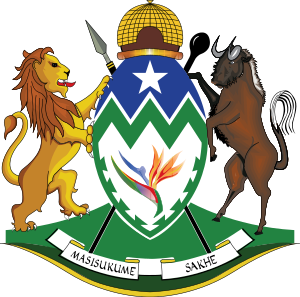
The Premier of KwaZulu-Natal is the head of government of the KwaZulu-Natal province of South Africa. The current Premier of KwaZulu-Natal is Nomusa Dube-Ncube, a member of the African National Congress. She is the first elected woman to assume this position and took office on 10 August 2022.

The Premier of Limpopo is the head of government of Limpopo province of South Africa. The current Premier of Limpopo is Stanley Mathabatha, a member of the African National Congress, who was elected in July 2013. He took office on 18 July 2013.
In South Africa, the Executive Council of a province is the cabinet of the provincial government. The Executive Council consists of the Premier and five to ten other members, who have the title "Member of the Executive Council", commonly abbreviated to "MEC".

The Constitution of the Western Cape is, subject to the Constitution of South Africa, the highest law regulating the structure and powers of the government of the Western Cape province of South Africa. It was enacted by the Western Cape Provincial Legislature in terms of Chapter 6 of the national constitution, and came into force on 16 January 1998. The Western Cape is the only South African province to have adopted a constitution.
The nine provinces of South Africa are governed by provincial governments which form the second layer of government, between the national government and the municipalities. The provincial governments are established, and their structure defined, by Chapter Six of the Constitution of South Africa.
Like South Africa's eight other provinces, the Northern Cape is governed by a parliamentary system, in which the Premier of the Northern Cape is elected by the Northern Cape Provincial Legislature and in turn selects the Northern Cape Executive Council. As in most other provinces, the African National Congress (ANC) has led the Northern Cape Provincial Government since the end of apartheid. In the most recent provincial election, held in 2019, the ANC won 18 of 30 seats in the provincial legislature and the Democratic Alliance was the official opposition in the legislature. Pursuant to the same election, Zamani Saul was elected Premier of the province.
Barbara Martha Bartlett is a South African politician. A member of the African National Congress, she has been serving as a permanent delegate to the National Council of Provinces since June 2020. From May 2014 to June 2020, Bartlett was a Member of the Northern Cape Provincial Legislature and a Member of the Executive Council in the provincial government.

Pemmy Castelina Pamela Majodina is a South African politician serving as a Member of the National Assembly since 2019. A member of the African National Congress, she is the party's chief whip in the assembly. She was formerly a Member of the Eastern Cape Provincial Legislature between 2004 and 2019 and a Member of the provincial Executive Council for five different portfolios from 2008 to 2019, respectively. Majodina was a permanent delegate to the National Council of Provinces from 1994 to 2004.
Motlalepula Ziphora Rosho is a South African politician. A member of the African National Congress, she was elected deputy speaker of the North West Provincial Legislature in 2010. In 2012 she was appointed as the Member of the Executive Council (MEC) for Economic Development, Environment, Conservation and Tourism in the North West Provincial Government. Rosho was discharged from the executive council in 2014 and then served in the provincial legislature as a committee chairperson until December 2018, when she returned to the executive as MEC for Local Government and Human Settlement. Rosho was appointed as MEC for Finance after the 2019 elections.
The North West of South Africa is governed in a parliamentary system in which the people elect the North West Provincial Legislature and the legislature elects the Premier as head of the executive. The Premier leads a cabinet of MECs overseeing various executive departments. The provincial government is subject to the Constitution of South Africa.

